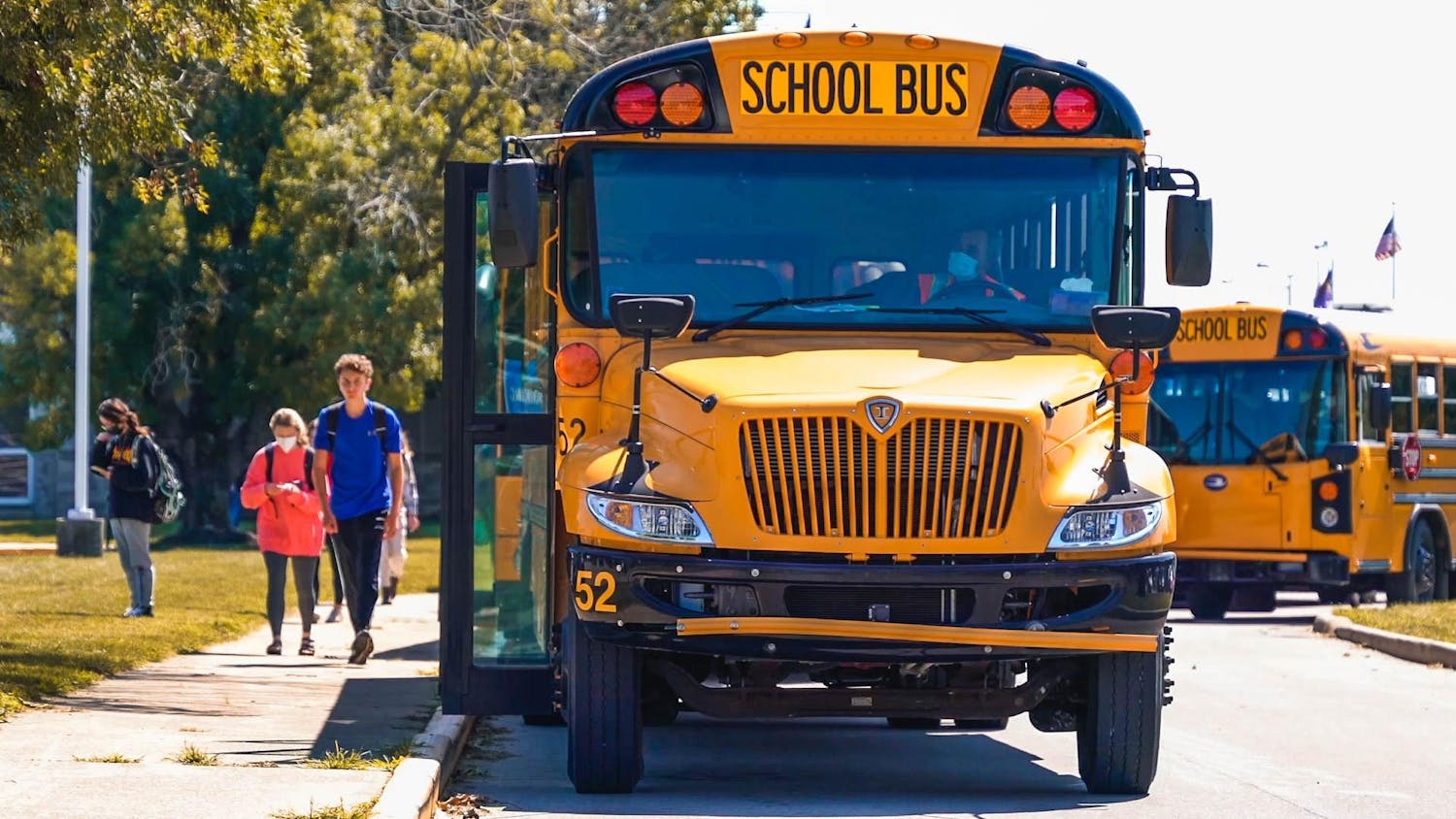INDIANAPOLIS — A sea of rainbow cascaded down the steps outside the Indiana Statehouse, where protesters adorned with pride flag capes and colorful accessories were lining up on the cold Monday morning.
One at a time, they slowly trickled inside the building. A few times, someone tried to start a chant “No hate in our state! No hate in our state!” — but those quickly died down. It was only 7:30 a.m. — they had a long day ahead and they needed to save their energy.
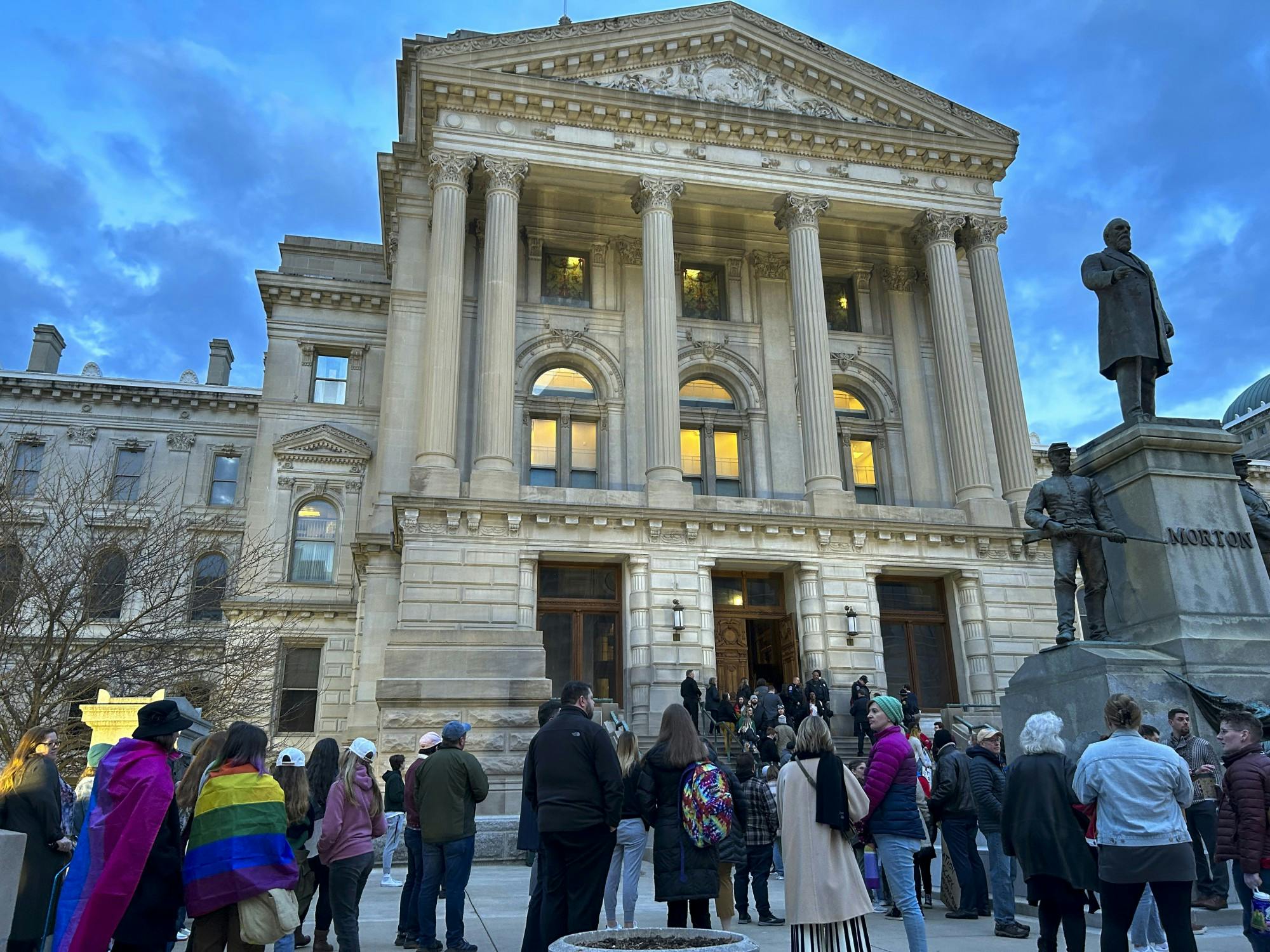
The ACLU of Indiana called for a rally at the Indiana Statehouse Feb. 20 to oppose House Bill 1608, which was being heard in the House Education Committee. The bill, often compared to Florida’s “Don’t Say Gay” bill, would prohibit school employees from providing instruction on human sexuality to students in kindergarten through third grade.
The bill received backlash from protesters saying it sends a dangerous message to LGBTQ Hoosiers, while supporters of the bill said it protects the rights of parents to teach sensitive topics to their children themselves.
HB 1608 is one of the number of bills targeting LGBTQ+ youth that have been introduced in the state House and Senate, which critics have called a “slate of hate”. The ACLU of Indiana is calling on Hoosiers to pack the Statehouse again on Wednesday to protest Senate Bill 480, a bill that would prohibit physicians from performing gender transition procedures on minors.
The hallway outside the Indiana House chamber was swarming with protesters. Hundreds of people from all over Indiana — teachers, students, families with young children — all squeezed together into one giant clump in front of the chamber window, united by a common purpose.
The excitement of the crowd was almost palpable, as if the single layer of glass separating it from the legislators could crack any minute, releasing a rushing rainbow wave into the chamber. The floor vibrated under the feet of the protestors stomping to the beat of their chant.
“We say gay!”
“Gay!”
“We say gay!”
“Gay!”
For 20 minutes they repeated the chant nonstop. Despite the hot, stuffy air and the indifference from many of the legislators inside, their collective voice never faltered.
After hours of debate and public testimony, the House Education Committee voted along party lines to approve the bill 9-4. The full House will now hear the bill before sending it to the Senate.
Rep. Michelle Davis, R-District 58, authored the bill, with Rep. Jake Teshka, Rep. Chris Jeter and Rep. Robert Heaton as co-authors.
"The goal of House Bill 1608 is to empower Hoosier parents by reinforcing that they’re in the driver's seat when it comes to introducing sensitive topics to their children,” Davis said during the hearing. “Parents know what is best for their children and their authority should not be superseded by teachers and school administrators.”

Davis said the bill is common sense legislation that supports parents’ fundamental rights to be involved in decisions about their children.
An amendment was added to the bill requiring teachers in Indiana public schools to notify the parents if a student changes their gender identity or preferred name or pronouns. School employees would be required to use only the name and pronouns to identify a student consistent with their sex unless the parent requested a change in writing.
The original bill banned discussion or instruction about gender fluidity, gender roles, gender stereotypes, gender identity, gender expression and sexual orientation. Another amendment removed that list of topics and changed the bill to prohibit young students from being taught about “human sexuality,” which Davis described as “the way people experience and express themselves sexually.” Under the bill, teachers will still be able to respond to questions from students about human sexuality.
Davis said the bill aims to prohibit sexual education for students in third grade and below because that is not an appropriate topic for young students. She conceded that Indiana students are not currently learning sex education in those grades.
Inside the house chamber, members of the House Education Committee struggled to be heard over the roar of the crowd on the other side of the glass.
Chants of “Kill the bill!” and “Shut it down!” drowned out the voices of the authors of HB 1608 as they debated the amendments.
“You should be ashamed!” one man shouted from the gallery. “You should be ashamed!”
He was immediately removed from the chamber by Indiana State Police at the direction of Chairman Robert Behning.
The chanting died down when public testimony started. But for more than three hours, the demonstrators cheered when opponents of the bill spoke and booed for the bill’s supporters.
How would the bill affect students?
Some members of the public who supported the bill voiced their concerns about exposing children to controversial and inappropriate topics at a young age during public testimony.
“I do not want my naïve and innocent third grader exposed to such sexualized concepts,” Ted Adams, a trial and prosecuting attorney, said. “It does not belong in the classroom at a tender age.”
IU student and Bloomington City Council candidate Conner Wright said he spoke at the testimony to oppose the bill as an ally for his LGBTQ friends, some of whom are on track to become teachers for kindergarten through third grade.
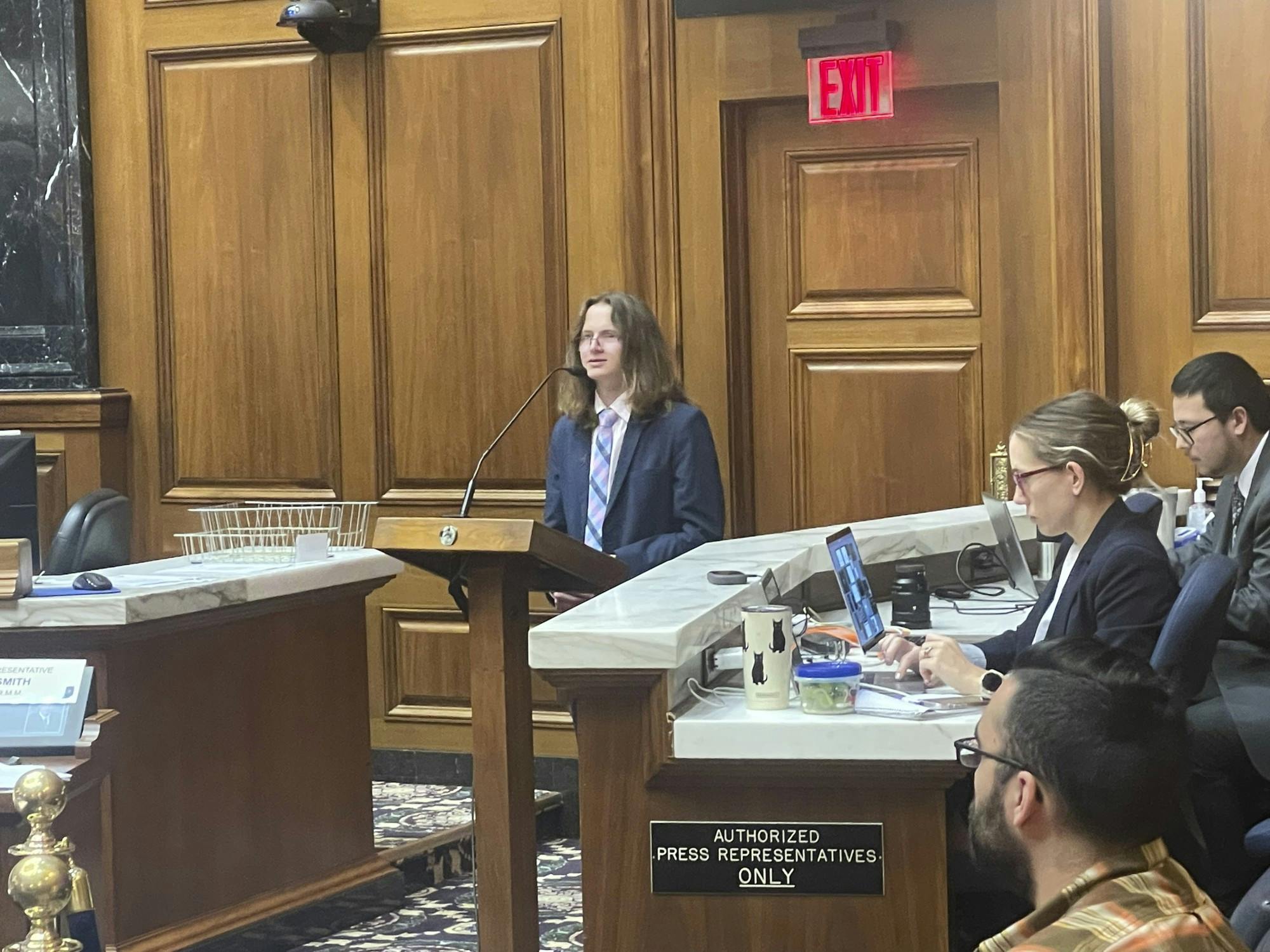
“I’ve heard a lot of concern about the impact of teaching kids inappropriate things at too young of an age,” Wright said. “But what about the impact of teaching kids they should hide their true selves to exist in school? What about the impact of teaching kids that if they’re different, that’s something they should be ashamed of?”
Many members of the public said LGBTQ students are already a vulnerable community, and this bill would only continue to make them feel unwelcome and unaccepted.
“Is the act of sharing who people love so heinous that it must be banned? I certainly don’t think so,” Wright said. “Not more so than teaching kids to hide their differences for fear of not being accepted by the world.”
Claire Curran, a student at Brebeuf Jesuit Preparatory School, said the bill tells LGBTQ people that they should be hidden from society and that they don’t deserve to take up space.
“In continuing to utilize rhetoric that paints LGBTQ people as inappropriate for children by the broad language in this bill, we contribute to the systemic dehumanization of LGBTQ people,” Curran said. “This dehumanization is dangerous, and it is life threatening.”
How would the bill affect teachers?
Some of the educators who testified are concerned that HB 1608 would prevent them from being able to support LGBTQ students.
“It feels like a gag order,” Pike Township Schools psychologist Kristie Carter said. “How can we support children in K through third grade who are internalizing and externalizing conflicts, whatever they may be? Almost any topic a child brings up can fall under human sexuality.”
Some opponents of the bill said it is too vague and ambiguous. It could create a chilling effect in the classroom because it is not clear about what topics teachers are permitted to talk about.
“I don't like the idea of not being able to talk to my kids just about the way that different people live their lives, because at some point they're going to meet a gay person probably before anyone tells them what being gay is,” IU student and student teacher Sophie Cahlamer said outside the statehouse. “Doing it in a classroom where there's thought put into it and care put into it is important, and not saying it, it's just erasing the fact that we exist.”
Katie Blair, the director of advocacy and public policy for the ACLU of Indiana, said if passed, the bill would prevent any mention of LGBTQ people in classrooms.
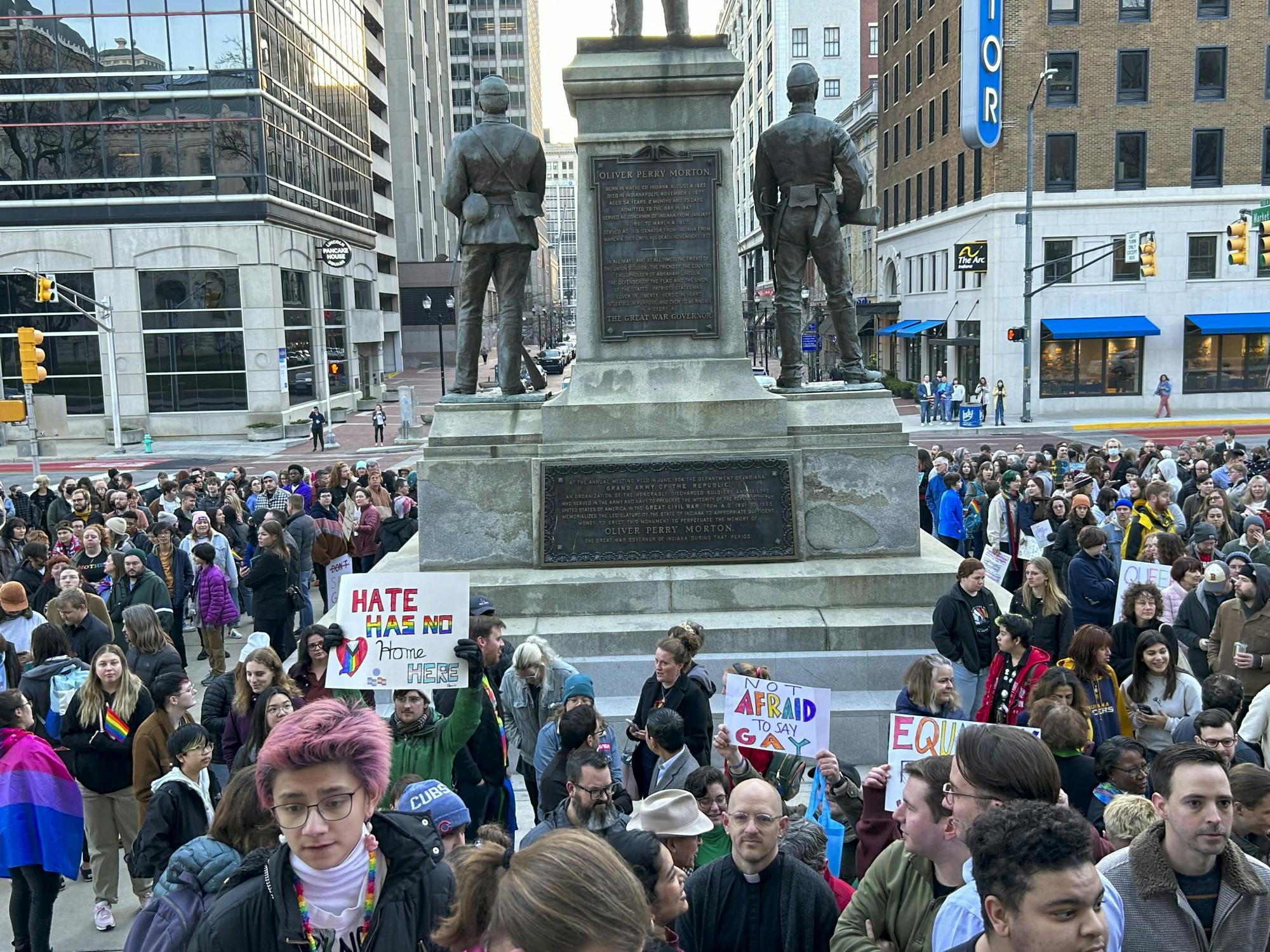
Under HB 1608, Blair said LGBTQ teachers could be breaking the law just by mentioning they are married.
“Teachers who happen to be transgender could lose their jobs simply for existing,” Blair said. “It bans teachers from using language validating their identity. This turns teachers into gender police.”
Pastor Dakota Roberts of St. Peter's United Church of Christ said that the Indiana legislature should leave classroom decisions up to teachers and school boards.
“I hear every week on the deficiencies of our Indiana school system,” Roberts said. “They lack adequate funding, staffing and equity. This bill’s authors should concern themselves more with paying our teachers than preventing them from doing their jobs.”
Ryan McCann, director of the Indiana Family Institute, said multiple teachers have left the profession due to administrators pushing curriculums they don’t agree with.
“Part of that is curriculum and administrators that are pushing teachers completely out of the profession simply because they want to stay neutral on controversial issues,” McCann said.
How would the bill affect parents?
Teshka, one of the bill’s co-authors, argued that the bill is about parental rights.
“It is about parents having the right to talk to their children at a certain time and in a manner that is consistent with their faith, their development, with their worldview,” he said.
Micah Clark, executive director of the American Family Association of Indiana, said if students have questions about sexuality, teachers should tell them to talk to their parents.
While some parents supported the bill because they said they should have the right to know and make decisions about what happens to their children at school, others opposed it, saying students and teachers should have the right to talk about all kinds of family configurations, including families with two moms or two dads.
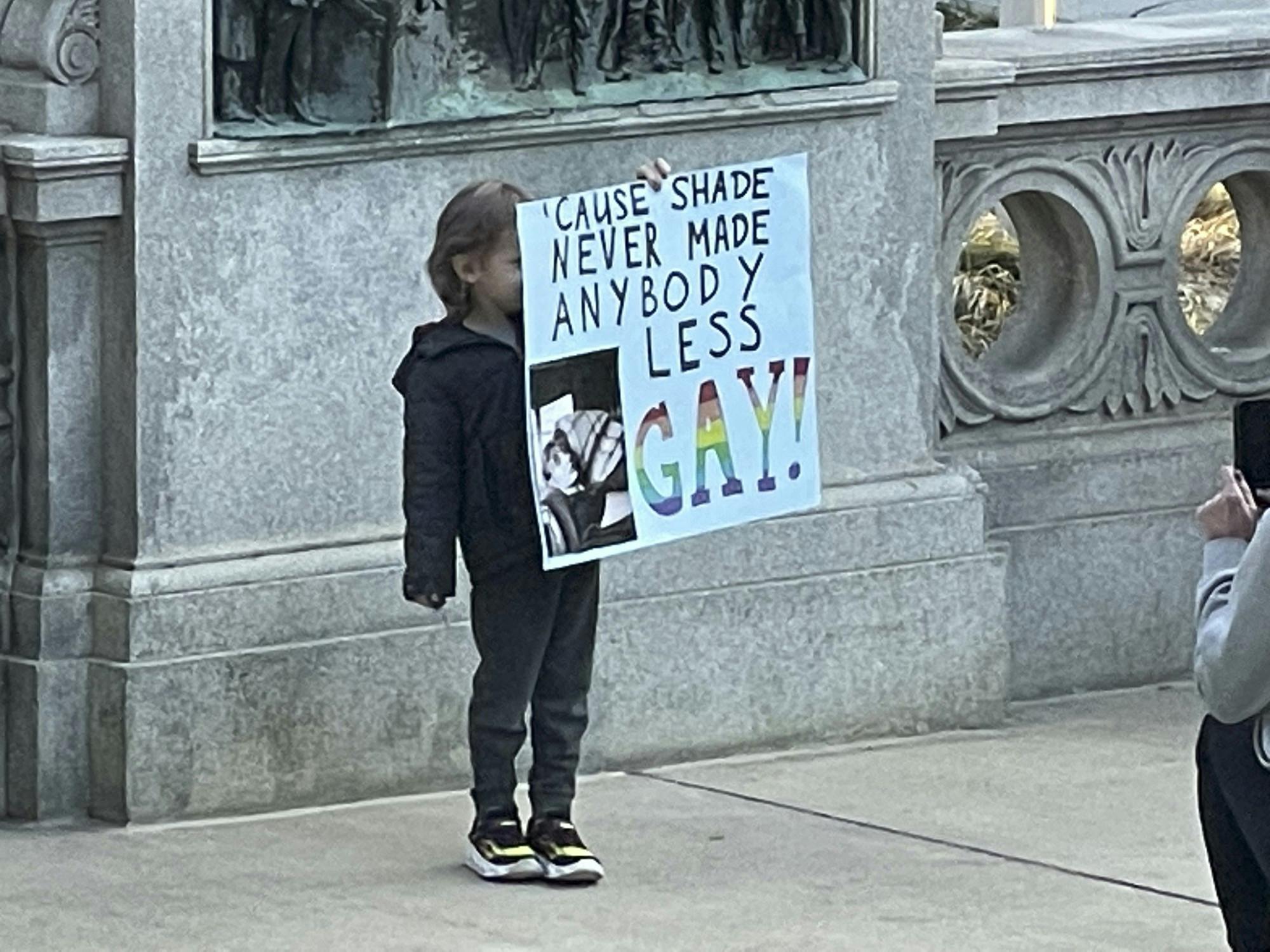
“She should be in classrooms where teachers are about to discuss the richness of all our American stories,” Jennifer Smith-Margraf, a teacher in Lafayette, Indiana, said about her daughter. “As an educator, I can tell you, I really don’t care what students want to be called. I care that they come every single day and feel safe in my classroom and do the work they’re asked to do and respect the students in that classroom.”
The protestors had been on their feet — chanting, stomping, cheering, booing outside the chamber window — since the early morning.
Almost five hours later, it was over. The bill was approved. It was time to go home.
Once loud and strong and united, the rainbow sea slowly began to trickle away, down the stairs and out the door of the statehouse. Disappointed but not surprised, the protestors went home, spreading out across the state.
If the bill passes the House and Senate, the repercussions would affect everyone in Indiana, not just students and teachers in kindergarten through third grade, IU student Ange Almanza said.
Almanza is an early childhood education major. They said they’re worried about how the bill would impact them, their students, and members of the LGBTQ community who won’t be able to be themselves at school.
“I’ve already hidden my identity for the majority of my life,” they said. “It’s just a bit traumatizing to have to think that I hid when I was younger because of my parents, and I’m going to hide again because of the parents of other people.”



